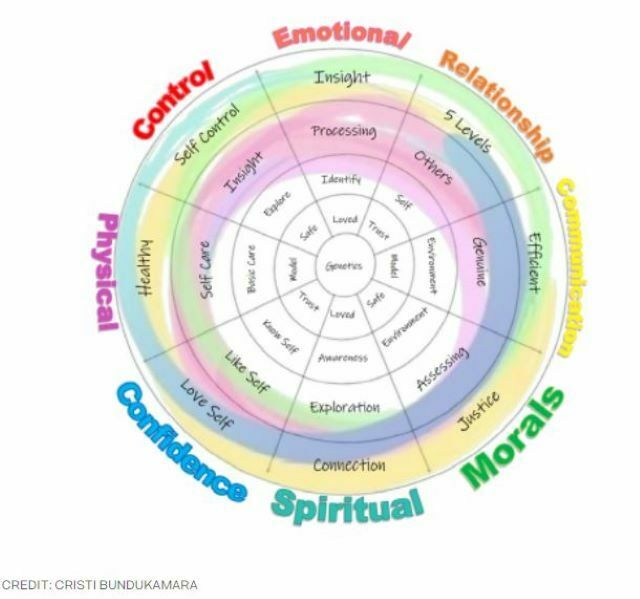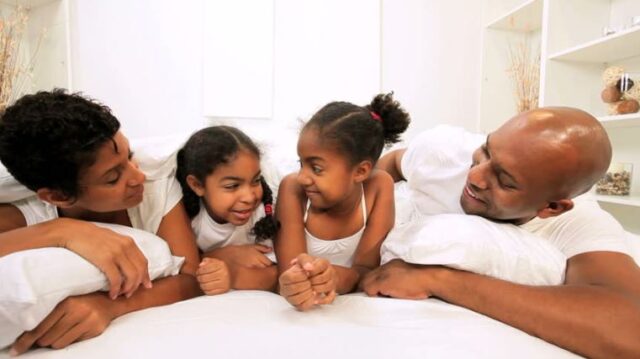With the pressures of today, many children and teens are facing mental health challenges. Parents can help their kids build strong mental health foundations by utilizing the eight prongs of Cristi Bundukamara, Ed.,D’s Growth Wheel. Here is how to raise mentally strong children according to the experts.

“As a mental health care practitioner who works with young children and new parents, I’ve created a Growth Wheel to emphasize the components of raising mentally strong children,” Cristi Bundukamara, Ed.D, said in an article that she wrote for Parents.com. “There are eight categories of growth that parents should consider when it comes to nurturing their children’s mental health: emotional, relationship, communication, moral, confidence, physical, and control.”
Bundukamara continued, “I use the Growth Wheel as a mindfulness intervention in clinical practice and encourage the families I work with to explore each of these categories to improve their mental wellbeing. Here’s how the Growth Wheel is set up and how to use it to raise a mentally strong child.”
Emotional Growth
Visualize the experience of emotions and stress with your children. Parents’ efforts to visualize their own emotions can help children understand mental stress as a normal experience and illustrate healthy processes of coping.
Relationship Growth
Co-create levels to express relationship needs and boundaries. It is important that children understand how varying levels of trust condition relationships with others and reflect important boundaries. Bundukamara suggests that parents make sure to distinguish parental relationships from any other.
Communication Growth
Acknowledge communication as a process and aspire for efficiency. Your goal does not need to be to understand all of the reasons for your child’s stress. Communication here is the key. It is never too early to start communicating openly with children.

Moral Growth
Empower children to make decisions with moral consequences by playing “you be the judge.” Psychologists believe that by age 6 to 7, children are able to consider complicated questions of justice and fairness. This encourages children to feel empowered to make decisions, thus developing their moral compasses.
Spiritual Growth
Dedicate time to talk about connection and transcendence. Children have an innate sense of awe and wonder. Ask them to talk about their philosophical beliefs, their answers may just surprise you. Arm them to discuss these topics and make it a regular conversation between you and your child. Prepare them for when they get older, as the topics will get harder.
Confidence Growth
Instead of praising your child for the product they created, you can speak to their sense of self by praising children for qualities like focus, creativity, and enthusiasm. Making sure that they are confident in themselves and in their skill, ensures stable mental health.

Physical Growth
Model self-care for your children. Research shows children can sense parent’s stress. You should discuss your stress and explain your reasons for practicing self-care. Normalize self-care. Find things that you can do with your children to demonstrate this behavior. Try yoga, walking, painting, or whatever you all find fun to do together. By doing this, you will have an opportunity to spend more time with them and teach them an important life skill.
Control Growth
Commit to routine techniques of mindfulness. Children and adults can learn a wide range of mindfulness techniques that can improve self-control and enhance personal insights. By helping your child learn self-control techniques, they will grow into adults that have it all together.
Recently, the Centers for Disease Control and Prevention warned of an accelerating mental health crisis among adolescents. They stated that 4 in 10 teens reported that they feel “persistently sad or hopeless.” The CDC also said that 1 in 5 teens have contemplated suicide.
“These data echo a cry for help,” said Debra Houry, a deputy director at the CDC in a recent interview. “The COVID-19 pandemic has created traumatic stressors that have the potential to further erode students’ mental well-being.”
Kids, of all ages, are crying out for help. Parents should arm themselves to answer the call. To read Bundukamara’s full article, click here.







